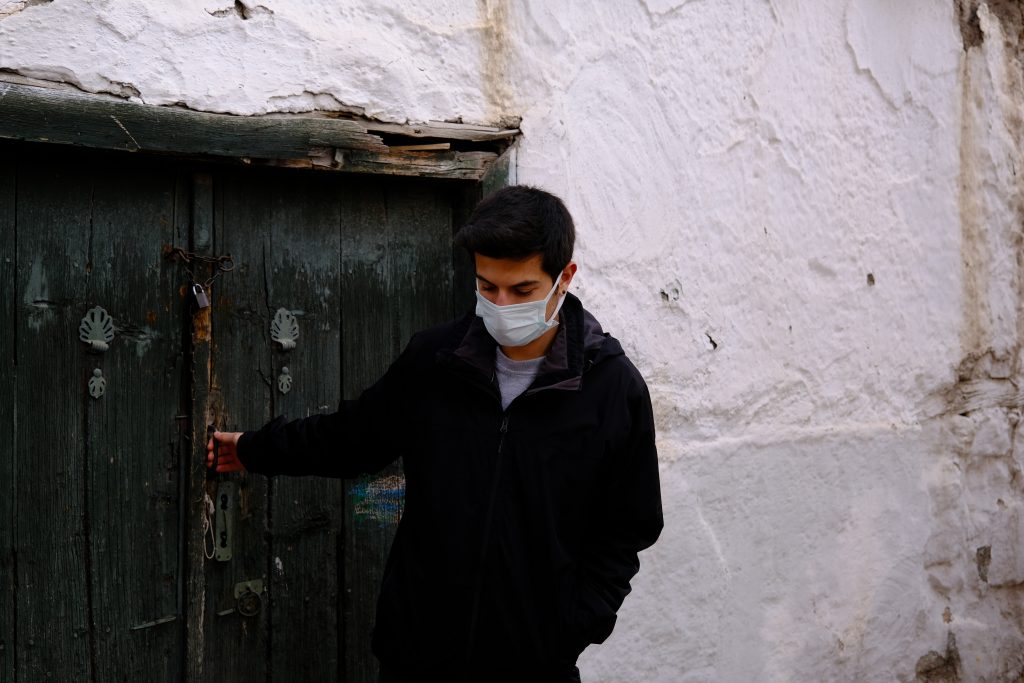Grief and Courage
Grief is common, unpredictable, and unwelcome. Here we will look at grief in Scripture, in the New Testament, as two of Jesus’ followers experienced it. It takes both grief and courage in the life of a believer to cope with grief in a godly way.
In life, most of us have endured a measure of grief. Whether collective or individual, mild or acute, we’ve encountered loss. We lost normalcy and vitality, community, family and many liberties. Some of us lost loved ones, their health. Many of us simply our daily hope and joy.
Many tend to shun grief and keep it distant. Of course, Jesus did not choose this approach on Good Friday, when He had the most reason to grieve. It takes courage to step out of hiding and willingly choose to touch grief with courage.

Grieving with Courage
During Passover this year, I deliberately meditated on the sequence of events that surrounded the death, burial, and resurrection of our Messiah. Almost all who walked openly with Yeshua (Jesus) in the miracles of ministry, abandoned Him in His darkest hour of persecution and sorrow of grief in scripture. Only a few remained, of those most stood at a distance, as He was being crucified.
“He was despised and rejected by men, a man of sorrows and acquainted with grief; and as one from whom men hide their faces he was despised, and we esteemed him not. Surely He has borne our griefs and carried our sorrows; yet we esteemed him stricken, smitten by God, and afflicted.” (Isaiah 53:3-4)
As I considered the excruciating trauma and pain of Yeshua’s disciples at the death of their friend and rabbi, something new stood out to me. Namely, the unlikely disciples who stepped forth to handle grief with courage. They literally took on the gruesome task of touching, carrying, binding up and burying the lifeless body of our Lord.
Grief in Scripture: Joseph of Arimathea
In the Gospel, we read:
“After this, Joseph of Arimathea, being a disciple of Jesus, but secretly, for fear of the Jews, asked Pilate that he might take away the body of Jesus; and Pilate gave him permission. So he came and took the body of Jesus. And Nicodemus, who at first came to Jesus by night, also came, bringing a mixture of myrrh and aloes, about a hundred pounds. Then they took the body of Jesus, and bound it in strips of linen with the spices, as the custom of the Jews is to bury.” (John 19:38-40)
Nicodemus was a Pharisee, a respected member of the Sanhedrin. His name means conqueror or victorious among his people. He was a secret disciple of Yeshua, likely reticent for fear of the religious leaders. Nicodemus had approached Yeshua by night, discussing the Kingdom of God and the concept of being “born again” (John 3).
His covert faith grew bolder as he spoke up on behalf of Yeshua. It happened on the last day of the Feast of Tabernacles when the religious leaders maligned Yeshua’s character and teaching (John 7).

Grief and Courage for Joseph of Arimathea and Nicodemus
Joseph of Arimathea was a wealthy and prominent member of the religious council. He was a secret disciple for fear of the Jews, yet he too was waiting for the Kingdom of God. After the crucifixion, just before the sabbath started, Joseph took courage and asked Pilate for the body of Yeshua.
He offered what he had: his own hewn-out tomb and willing hands. Joseph was ready to perform the grievous custom of wrapping the broken body of our Lord in linen and spices for burial. All four gospels recount this bold act of service to Yeshua.
When others stood at a distance, these two hidden disciples emerged from the shadows. Nicodemus and Joseph took center stage to cooperate with the redemptive plan of the Father.
Joseph and Nicodemus left the hidden safety of religion to stand with the crucified Messiah as true disciples. They requested His body in death, even though He was disfigured beyond recognition, in a final quest to honor His life.
They Risked Shame for the King
These two men shouldered the blood-stained cross and its splinters to lower the crushed body of the King. Willingly, they became ritually unclean by touching a dead body of the One whose sacrifice “once for all” made us holy. They laid their hands on the sinless Redeemer upon whom was the iniquity of us all. Holy flesh stricken for the transgression of His people:
“But he was pierced for our transgressions; he was crushed for our iniquities; upon him was the chastisement that brought us peace, and with his wounds we are healed. All we like sheep have gone astray; we have turned—every one—to his own way; and the Lord has laid on him the iniquity of us all.
He was oppressed, and he was afflicted, yet he opened not his mouth; like a lamb that is led to the slaughter, and like a sheep that before its shearers is silent, so he opened not his mouth. By oppression and judgment he was taken away; and as for his generation, who considered that he was cut off out of the land of the living, stricken for the transgression of my people?” (Isaiah 53:5-8)
They Showed Radical Love in the Face of Fear and Death
They attended Him in the depth of His ultimate sacrifice. Prying out nails to loose bound hands and feet, removing thorns from the torn brow still dripping precious blood. The pure heart that broke for His people Israel, for all humanity, was pierced and silent. His broken body fell heavy as they handled The Way, the Truth, the Life.
Who joined them in this grievous task? John, Mary, a Centurion, others whose names we never heard? Did John reflect on this moment as he later penned his testimony?
“That which was from the beginning, which we have heard, which we have seen with our eyes, which we have looked upon, and our hands have handled, concerning the Word of life—the life was manifested, and we have seen, and bear witness, and declare to you that eternal life which was with the Father and was manifested to us—that which we have seen and heard we declare to you, that you also may have fellowship with us; and truly our fellowship is with the Father and with His Son Jesus Christ.” (1 John 1:1-3)

They Leaned In
They leaned in to shoulder the weight and carry the Author of Life who bore our sorrow and grief. Did they place Him on their own shoulders? Or perhaps on the same donkey that a week prior carried Him into Jerusalem to shouts of Hosanna? The sons of men escorted the Son of Man to a borrowed tomb.
“And they made his grave with the wicked and with a rich man in his death, although he had done no violence, and there was no deceit in his mouth.” (Isaiah 53:9)
“We always carry around in our body the death of Jesus, so that the life of Jesus may also be revealed in our body.” (2 Corinthians 4:10)
They Faced Grief with Courage
Nicodemus and Joseph cooperated with the plan of the Father. Theologically, I cannot comprehend this mystery. What sort of God is this who presides over such a story, where justice and mercy, wrath and love meet in the fullest measure? Surely the Father knew anguish and grief beyond what humanity could possibly comprehend. How could He but otherwise, for the Father and Son are one.
“Yet it was the will of the Lord to crush him; he has put him to grief; when his soul makes an offering for guilt, he shall see his offspring; he shall prolong his days; the will of the Lord shall prosper in his hand. Out of the anguish of his soul he shall see and be satisfied; by his knowledge shall the righteous one, my servant, make many to be accounted righteous, and he shall bear their iniquities.” (Isaiah 53:10-11)
In the perfection of His eternal plan, did the incorporeal Father long to embrace the incarnate Son? Joseph and Nicodemus as deeply religious men knew the Hebrew scriptures. In the darkness of the tomb, did they recall the words of Yeshua, declaring His own resurrection in three days? Did they recall biblical prophecies of the promised Messiah, the suffering servant and victorious King?
“Come, let us return to the LORD. He has torn us to pieces but he will heal us; he has injured us but he will bind up our wounds. After two days He will revive us; on the third day He will raise us up, that we may live in His sight.” (Hosea 6:1-2)
Grief in Scripture: Witnessing Life Out of Death
Soon rumors started to circulate, questioning the veracity of his death and location of His burial. If anyone could quell them, these men knew the truth. They had touched the truth in the depth of grief in scripture. They were with Him in the interim between ashes and beauty, despair and praise.
Not every story of grief is resurrected in this life. And not every weighty stone of pain and sorrow rolls away into victory. But the most significant one was – the one that bridged man and God, temporal struggle to eternal glory.
In this life, there will be loss, pain, and grief. Our world is broken and in need of rescue. Our hearts and stories follow suit. Yet we are not those who grieve without hope. He is the God who turns mourning into dancing, and barrenness into fruitfulness. Yeshua conquered death with life through the great exchange.
Brothers and sisters, we do not want you to be uninformed about those who sleep in death, so that you do not grieve like the rest of mankind, who have no hope. (1 Thessalonians 4:13)

No Grief and Courage without Hope
It would seem trivial to conclude my ponderings with insights on how to better face grief with courage. I won’t tell you how to hold on in faith for blessed turn-around. Or even to endure the risk of hope and lean in with honesty to the reality of pain.
My words would seem trite and insincere, for I don’t know the depth of your grief and pain. Today, I am simply in awe of two disciples who stood face to face with the darkest death. And yet, they chose to hold on to the Author of Life.
“The Spirit of the Sovereign Lord is on me, because the Lord has anointed me to proclaim good news to the poor. He has sent me to bind up the brokenhearted, to proclaim freedom for the captives and release from darkness for the prisoners, to proclaim the year of the Lord’s favor and the day of vengeance of our God, to comfort all who mourn, and provide for those who grieve in Zion—to bestow on them a crown of beauty instead of ashes, the oil of joy instead of mourning, and a garment of praise instead of a spirit of despair. They will be called oaks of righteousness, a planting of the Lord for the display of his splendor.” (Isaiah 61:1-3)
Bless Israel by Transforming Lives
Are you looking for a way to start blessing Israel financially? FIRM has a simple way to start putting kingdom investment into impacting lives in Israel.
The Tribe is a passionate and faithful group of monthly donors on a mission to transform lives in Israel through the love of Jesus. Join the Tribe today: firmisrael.org/thetribe